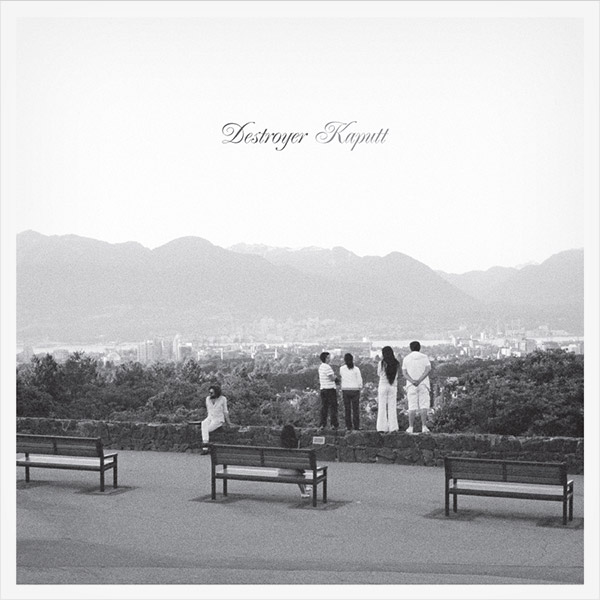
Destroyer
Kaputt
(Merge; 2011)
By Alan Baban | 24 January 2011
Kaputt is the story of Dan Bejar’s voice, widely recognized, insensible, drunk, and donnish. For those of us who’ve followed the man’s career, hearing this voice—this voice that takes love lyrics and converts them, with shrieking abruptness, to something like “Tell that to the fucking marines, princess!”—is indivisible from the central Destroyer experience. And yes, it’s an “experience.” Tell me that you’ve never got drunk to This Night (2002); that you didn’t have to drink that much because that record already is the trip: the bottomless discharge of emotions, scrappy late-night guitar wankathons, the idea that you’re somehow “doing” Neil Young “doing” David Bowie in the ’70s. You can rag on Bejar’s locutions all you want—he’s shrill and repetitive, we get it—but even as dude’s regaled us with the trouble in his dreams, in his apartment, or given suck to various rock fantasies (“What up Carey, it’s Dan. Just checking if Frog Eyes is still down to jam this Sunday? Also: bring Krug”), even as he’s, y’know, toured with a proper band, with Loscil, with Carl Newman and the New Pornographers, and is signed to Merge—through all this, Bejar’s voice, his hawking, coughing, nasal, pissed-off, and loving the shithouse that is the world voice, remains human.
Going to the root of all this, and in Bejar’s obscured and frothy imagery there’s always an emotional root, the man works best when his records act almost like diary entries. I don’t mean just the lyrics; it’s the whole package Dan brings to the table. From Streethawk: A Seduction (2001) on, his best material seizes on a memory reduced to its most easily appreciable motifs (love, unrequited love, grief), a big experience, or a smear of them, and it’ll proceed to setting those memories in a sorta dadaist headwind, reinforcing them with remembered melodies, meta-tropes, and, as on most tracks on Kaputt, big gloops of saxophone. It’ll canvass its territory and then, maybe when you least expect it, Bejar will fuck the thing up. As in, “destroy” it. The lyrics most of the time won’t make sense.
So: “destroy” it? To get why Kaputt is such a major achievement, it is useful to look at the records that have preceded it. First up, the tepidly received Trouble in Dreams (2008) (or, as the haters would have it: the bah-bah-bah-bah-bah-bah-bah-DAAH-DAAH record). Okay, it’s by no means a bad record, just an exhausted one. Dan doesn’t sound so much like he’s going through the motions; rather, he sounds like he’s forcing himself through the grind, as if he didn’t believe it, any of it, anymore. Which is ironic, considering it’s his “rawk” record—but the intro guitar solos sound joyless greetings, the long tracks are too long, re-hashed, and worse still, the album lacks the big sense of subversion and inspired meandering that shot the Rubies (2006) to the stars.
Dan was sort of half-assedly destroying shit In Dreams. Who else would derail the spectral, floating “My Favorite Year” with twenty seconds of incongruous and tinny bazooka shrieks? Or start the eagerly anticipated follow-up to Destroyer’s Rubies with this almighty exhale: “Okay / Fine.” Fine!? That is a man who doesn’t want to play rock ‘n roll or write songs anymore. Kaputt is exactly that same sound but like one hundred percent less convincing, because, uh, paradoxically the new Destroyer record—the one where he doesn’t screech, barely bahs, and doesn’t play guitar—is his best rock statement yet.
Kaputt contains quite simply, track-by-track, the best rock vocal performances I’ve heard in ages. Bejar is exercising a zen-like emotional solemnity that’s making me think Blood on the Tracks (1975), the “song” side of Low (1977), maybe even a little “Tower of Song” if we’re talking Leonard Cohen. Dan is way less of a gas-bag on these nine tracks—for long stretches he buttonholes his gas-bagginess completely—and for the first time since Streethawk it actually sounds like he’s fully working with the music around him instead of clamming several lines of verbiage through it. Check the phenomenal “Suicide Demo for Kara Walker,” which initially got released as a demo on a Merge comp last year. That demo was intriguing enough but hearing Dan incant the same words, fitting them around acid-jazz freakouts, disco-synths, and programmed beats—the effect is incendiary, easily the equal of “Bay of Pigs” (which appears on this album in slightly truncated form.)
The album as a whole, musically, is also Bejar’s most distinct. The digest version might be that he’s made widescreen and high-definition the cock-and-bull Casio lullabies of Your Blues (2004). But Kaputt is more risky than that, I feel, because Bejar isn’t doing this with a raised eyebrow and air quotes—no, he means it. His voice sells this shit, flips what could have been a lazy saunter through ’80s new-wave (“Savage Night at the Opera”) into something almost mythologically wrecked. (By the time Dan tells us “to set the loop and go wild” after three minutes of narcotised mumbling, we’re all ready to explode with the frenetic guitar solo that follows.) CMG’s Chris Molnar is on-point in calling “Song for America” “some kind of zombie Gaucho (1980) outtake,” to which I’d just add: holy shit! Coming as it does after the coke-drama of the title track (where it’s lyrically alluded to), and “Downtown”‘s come-down disco thuds, the song is spare, funky, and a brief release from the ass in the lion’s skin critic- and hater-baiting that’s taken up the last few tracks.
Here, Dan just sounds carefree; like he just doesn’t care. What makes this album amazing is that he really doesn’t. Kaputt is the sound of an artist released from his back catalogue and his own notions of how a song should be sung, or written. It is a mighty, mighty piece of work and really worth celebrating. In my mind, this is Destroyer’s best album yet.





